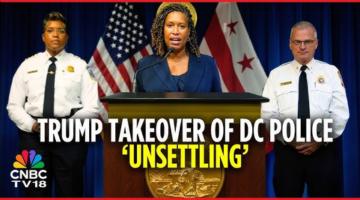BAR Book Forum: Walidah Imarisha’s “Angels With Dirty Faces“and Vincent Lloyd’s “Religion of the Field Negro”
Our authors explore the evils of incarceration and the promise of Black liberation theology.
“How do we challenge everything we’ve been told about the criminal legal system?”
In this series, we ask acclaimed authors to answer five questions about their book. This week’s featured authors are Walidah Imarishaand Vincent W. Lloyd.Imarisha is a writer, organizer, educator, and spoken-word artist. Her book is Angels with Dirty Faces: Three Stories of Crime, Prison, and Redemption.
Lloyd is Associate Professor of Theology and Religious Studies at Villanova University. His book is Religion of the Field Negro: On Black Secularism and Black Theology.
Walidah Imarisha’s Angels With Dirty Faces
“Prisons function by showing folks inside as predators, as monsters.”
Roberto Sirvent: How can your book help BAR readers understand the current political and social climate?
Walidah Imarisha: In Angels with Dirty Faces, I attempt to ask questions, and to tell human stories. If folks are looking for clear definitive answers, I want to be clear up front I don’t know that I have any to give. But I believe that to understand issues of prison, of harm, of the criminal legal system, we have to ask different questions, without assuming we know the answers based on what has been indoctrinated into us. We have to ask difficult questions with no easy answers: How do we challenge everything we’ve been told about the criminal legal system? How do we see that prisons have nothing to do with crime and everything to do with social control? If prisons do not make us more safe (and actually make all of us less safe), then what? What happens when people harm one another? How do we hold people accountable for sometimes horrific acts, while still holding their and our humanity?
I believe it is in the asking of what feels like impossible questions and the attempts to answer them that we are at our most human.
What do you hope activists and community organizers will take away from reading your book?
I hope folks in movements can use this book as a tool to think about how the carceral mentality – the idea of punishment, retribution, control that is the heart of the prison system – is present in every part of our society. Prisons affect every one of us every moment of every day. Whatever your work in the community is, the carceral mentality and racialized criminalization is embedded in it. Dreaming justice is the work of all of us.
“Prisons affect every one of us every moment of every day.”
I also hope folks will take away the absolute necessity to center the voices of the marginalized and oppressed. That when we talk about prisons, we see those incarcerated as the courageous and brilliant leaders and organizers they are. And how organizations led by those folks who live at the intersections of identity and oppression -- queer and trans folks of color, working class women of color, undocumented immigrants with disabilities, and so many others – offer all of us an understanding of holistic justice. When the leadership of those at the intersections of oppression is centered, that is when we begin to envision what true liberation could be.
We know readers will learn a lot from your book, but what do you hope readers will un-learn? In other words, is there a particular ideology you’re hoping to dismantle?
I hope to challenge the false connection that is drilled into all of us that there is a direct link between crime and harm and prison, and the inevitability of prisons. We must make sure crime and harm are separated out – harm is when one of us does injure to another, however that manifests. That must be addressed. Crime is a political concept based on laws, and laws are created to uphold existing power structures. It was a crime to support enslaved Black folks’ attempts at freedom. Crime changes depending on the political need for social control. Harm does not change.
“Laws are created to uphold existing power structures.”
I chose to write my book as I did – as three people’s narratives about major harm connected to prisons –because I believe stories are how we shift culturally and individually. Oppression reproduces itself by eradicating humanity. As I did work in the community and scholarship around prisons, I realized prisons function by showing folks inside as predators, as monsters. Not as people. Stories are how we see the color of humanity this system would have us otherwise erase.
Who are the intellectual heroes that inspire your work?
There are so many countless folks in general, and specifically around issues of prison, crime, justice. Of course public intellectuals like Angela Davis and Ruth Wilson Gilmore are foundational.
Also the intellectual heroes behind bars, doing organizing and thinking and writing that will help us all get free. I have been immensely honored to learn from and be mentored by incarcerated folks for well over half my life. I especially have relied on the work of political prisoners like Mumia Abu-Jamal and Sundiata Acoli to understand the connection between prisons and our larger society.
Lastly, the organizations doing the work on the ground are my intellectual heroes. These are the folks creating theory and then putting it into action. These organizations – so often led by women of color and queer and trans folks of color – need to be seen as intellectual creators and builders. I tried to highlight some of these incredible organizations that have inspired me and that I have learned from in my book, but there are so many, and more every day, an every expanding multiverse of change
In what way does your book help us imagine new worlds?
I want to dream and build a world without prisons, and a world rooted in loving justice. When I tell folks I am a prison abolitionist, I believe prisons make us less safe, I believe there are countless ways to address harm that is done but prison is not one of them, folks often have a very difficult time engaging with that. Because even if they understand that prisons are a mechanism of social control and are rooted in racialized criminalization like slavery, we have all been told that without prisons, without police, without the criminal legal system, our society would disintegrate. I hope my book aids folks who are imagining what justice could be in community, what a justice rooted in healing and love and accountability and humanity would feel like on our skins, on our tongues, in our hearts.
Vincent Lloyd’s Religion of the Field Negro
“Secularism turns revolutionaries into reformers.”
Roberto Sirvent: How can your book help BAR readers understand the current political and social climate?
Vincent Lloyd:My main target in Religion of the Field Negro is pragmatism, particularly as it sets the horizon for black politics today. I argue that we don’t need to choose between the options on the table. We need to overturn the table and build our own.
Some scholars try to make distinctions between crude forms of pragmatism, just doing what is expedient, and subtle, philosophical forms of pragmatism informed by the legacy of William James, John Dewey, and other primarily rich, white North Americans. I don’t buy it. Our task isn’t just identifying more social problems that need fixing, gaining a better perspective on problems, or shaking off habits of thought that conceal problems.
Our task isn’t to realize the possible, it’s to force the impossible into existence.
We must not be constrained by “necessities.” We must not believe in the world more than we believe in the struggle.
“You don’t want to be standing next to a secularist when it comes time for the rapture, or the revolution.”
This means we must have faith. Black theology, at its best, names precisely this faith in a world that is otherwise, a world of justice, a world we are told is impossible, a world achieved through struggle.
The opposite of black theology is secularism, accepting the constraints of the world, choosing between the options on the table. Secularism is eminently reasonable. It is easy. It is comfortable. It promises worldly rewards. But you don’t want to be standing next to a secularist when it comes time for the rapture, or the revolution.
Black theology isn’t what black Christians, or Muslims, say about God. In fact, institutional religion, tethered to practical, worldly interests, has always been suspicious of black theology.
Black theology names a commitment found among those working to overthrowing the powers that be, working to realize a world where the last will be first, whether or not the word “God” in invoked.
To borrow from the inimitable Malcolm X, black theology is the religion of the field Negro.
What do you hope activists and community organizers will take away from reading your book?
Activists and organizers, at their best, are already committed to black theology. Christians, at their best, are already committed to black theology. My book tries to show how this is the case, and so to make new coalitions possible.
Consider abolitionism. It names a disposition to say NO to worldly injustice even if we don’t know what will happen next. Even if we’re told a world without prisons is impossible – just as a world without slavery was said to be impossible two centuries ago.
Secularists go on MSNBC and talk about the problem of mass incarceration, its racial and economic causes, and the reforms that are needed. Black theology names the abolition spirit that puts bodies on the line saying NO: NO to new prison construction, NO to the legitimacy of any prison, NO to those middle class women and men who make careers placing humans in cages.
“Christians, at their best, are already committed to black theology.”
Secularism is a mode of political engagement today, but it’s also a way of viewing the black past. Secularism turns revolutionaries into reformers, Christians and Muslims into agnostics – with these two moves functioning in tandem, to the same effect. The secularist tells us that Martin Luther King, Jr., cared about love, community, and kids, forgetting that he declared US racism and colonialism in violation of God’s law. The secularist tells us that the most important lesson of the late, great theologian James Cone is that everyone reads the bible from the perspective of their own community, not that God is black and Jesus came to save blacks – and to damn whiteness.
We know readers will learn a lot from your book, but what do you hope readers will un-learn? In other words, is there a particular ideology you’re hoping to dismantle?
We often think about black Christianity in simplistic terms. W. E. B. Du Bois puts this at the heart of The Souls of Black Folk: black Christianity means collective emotional release and it means community institutions. Sometimes it looks like these things, but it can be something more, as Du Bois brings out. Black Christianity (and Islam, and spirituality, and new religious movements) can harness the affective tumult born of white supremacy and capitalism to fuel collective struggle against the powers that be. This is what black theology properly names.
I demonstrate just how delicate black theology is, how easy it is for secularism to contaminate it – motivating the need for careful discernment that is at once religious and political, that is political-theological. I ask readers to think twice about dismissing black theology altogether when they come across examples of black theology falling short of its promise – just as they ought to think twice about dismissing black radicalism altogether when black radical projects fall short of their promise.
“Black Christianity can fuel collective struggle against the powers that be.”
In the middle section of the book, I consider how we tell stories about black organizing, black tradition, and hope. My contention is that secularism has contaminated the way we understand these topics, and we ought to approach these topics in a way that is guided by the aspirations of black theology. I aim for these discussions to model a black-theological style of approaching a larger set of topics in black social and political life.
Who are the intellectual heroes that inspire your work?
Religion of the Field Negro begins with four figures as “cornerstones”: black American theologian James Cone, black American writer James Baldwin, African theorist Achille Mbembe, and Caribbean theorist and writer Sylvia Wynter. All employ religious language and engage with religious ideas to some extent, all in the service of radical critiques of white supremacy (and other, interlocking modes of domination). By reading these four figures together, as participating in a shared political project, I aim to show how the terms “theology” and “secularism” transcend explicit religious commitments and name, rather, political orientations.
I do not claim that Cone, Baldwin, Mbembe, and Wynter, either individually or as a group, get everything right. They do not exemplify some pure form of black theology. Quite the opposite, I argue that each gets things wrong – and we can learn from what they get wrong. The thought of each is contaminated by secularism in some way, and it is our task as their readers and critics to notice this and to learn what it says about the limitations of their thought. Cone moved toward a depoliticizing multiculturalism. Baldwin romanticized love. Mbembe romanticizes intellectual alienation. Wynter tells a broad-strokes story at a distance from grassroots organizing.
In the later parts of Religion of the Field Negro, I reflect on two figures who emerge as something like intellectual heroes, Huey Newton and Steve Biko. Each blurs the lines around religion in a way that I argue is typical of black theology, and each exemplifies a faith in struggle aimed at achieving the impossible.
In what way does your book help us imagine new worlds?
In one sense, I do not aim to help others imagine new worlds. Others – artists, organizers, dreamers of all stripes – are perfectly capable of doing this, and are doing this, without any help from me. The problem is that those of us invested in the status quo, and intellectuals particularly, are not very good at hearing how the world is being imagined otherwise. The greater the investment we have in this world, which is to say the stronger our secularism, the more deaf we are to those imagining new worlds. So my book tries to name that investment we (really all of us, to different degrees) have in the status quo in order to open us to those imagining otherwise.
In another sense, Religion of the Field Negro is a book about black theology, and that means that it is a book about imagining new worlds. I hold up examples of exemplary thinkers and activists who did imagine new worlds: Cone, Wynter, Newton, Biko, and Jeezy are among these. But imagining otherwise always goes hand in hand with attacking the status quo, attacking the powers that be in this world – attacking secularism. Too often we focus on only half of this equation, imagining otherwise without attacking the status quo or attacking the status quo without imagining otherwise. My book tries to model the way these two impulses can and must be conjoined.
Roberto Sirvent is Professor of Political and Social Ethics at Hope International University in Fullerton, CA. He also serves as the Outreach and Mentoring Coordinator for thePolitical Theology Network. He’s currently writing a book with fellow BAR contributor Danny Haiphong called American Exceptionalism and American Innocence: A People’s History of Fake News—From the Revolutionary War to the War on Terror.
COMMENTS?
Please join the conversation on Black Agenda Report's Facebook page at http://facebook.com/blackagendareport
Or, you can comment by emailing us at comments@blackagendareport.com



















